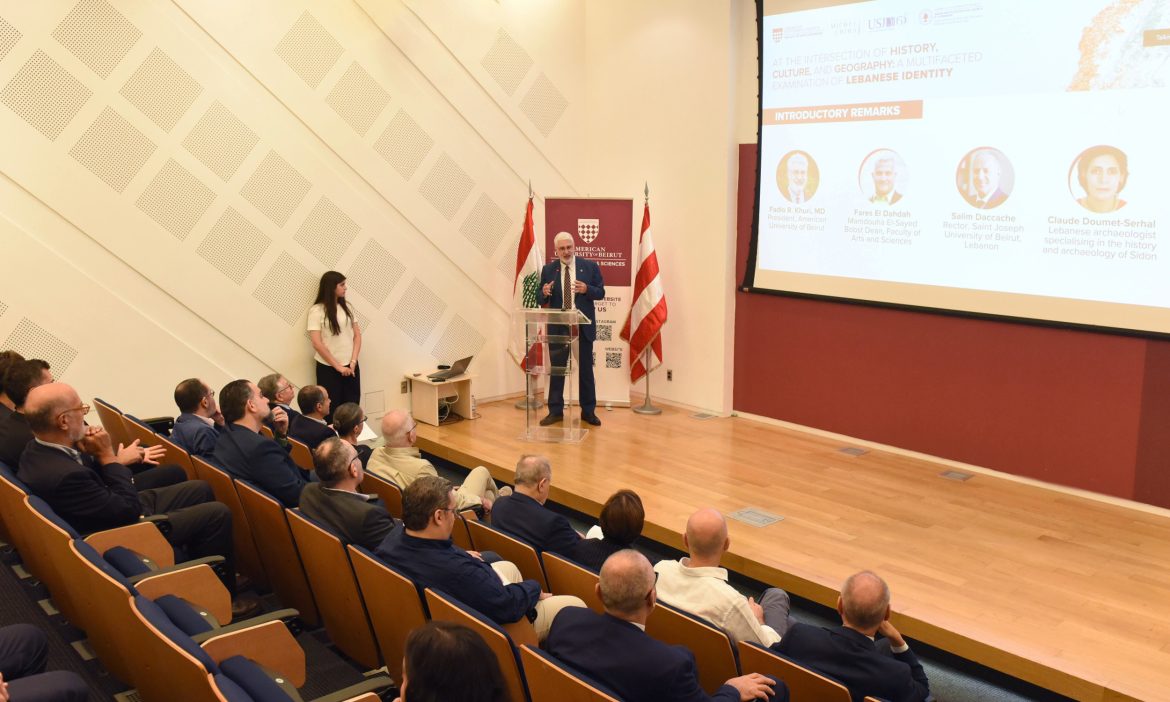The American University of Beirut (AUB), through its Faculty of Arts and Sciences (FAS) and Good Governance and Citizenship Observatory (GGCO) at the Asfari Institute for Civil Society and Citizenship, in partnership with the Michel Chiha Foundation and Saint Joseph University of Beirut (USJ), hosted an interdisciplinary conference titled “At the Intersection of History, Culture, and Geography: A Multifaceted Examination of Lebanese Identity.”
Bringing together leading scholars, policymakers, and cultural figures, the conference examined how Lebanon’s identity has been shaped by an intricate web of historical, cultural, linguistic, and geopolitical factors. Moderated by Dr. Joseph Maila, professor of geopolitics and international mediation at ESSEC Business School, discussions revisited foundational debates from the Cénacle Libanais and traced the evolution of schools of thought that have emerged since the establishment of the Lebanese Republic.
The proceedings began with words of welcome from Professor Fares El Dahdah, dean of the Faculty of Arts and Sciences at AUB, who greeted the distinguished guests and participants. Dr. Fadlo Khuri, AUB president, then delivered the opening address, highlighting the enduring role of Lebanon’s academic institutions in shaping the nation’s collective identity. He noted that “at the heart of Lebanon’s evolving identity lie its oldest universities. AUB and USJ have stood as anchors before the Republic itself—shaping, preserving, and renewing the shared values that keep Lebanon’s future possible.”
Dr. Khuri further emphasized that understanding Lebanon’s identity requires an interdisciplinary lens, remarking that “it is only through careful and interdisciplinary examination that we can better understand Lebanon’s complex identity, and when we honor its past, we can contribute to building a more informed and sustainable future.”
Throughout the event, speakers explored how politics, law, linguistics, natural resources, and even DNA studies continue to influence contemporary understandings of belonging and national pride. The dialogue revealed how these factors can both reinforce and challenge collective trust in the notion of a shared national identity—particularly amid the country’s ongoing political instability, economic crisis, and emerging anti-immigrant narratives.
Addressing the complexity of Lebanon’s unity amid diversity, Dr. Salim Daccache, USJ rector, reflected on the historical tension between plurality and nationhood, asking, “How can this identity be kept alive in a context where internal divisions and external judgments tend to delegitimize it? Lebanese history is marked by a permanent tension between multiple heritages and the desire to build national unity.”
Representing the Michel Chiha Foundation, Dr. Claude Doumet-Serhal, archaeologist and president of the foundation, connected the conference’s theme to the vision of Michel Chiha himself. She remarked that the event “aligns seamlessly with the mission of the Michel Chiha Foundation. Dialogue and critique are arguably the most effective, if not the only, means of meaningful engagement with the legacy of a man whose message continues to resonate through vigorous, critical reexamination. Identity is a dynamic process in which past and future remain open to reinterpretation, fostering coherence across time.”
Dr. Simon Kachar, founding and current director of GGCO and lecturer in political science at AUB, noted that the conference is vital for good governance because a stable, effective state requires a shared sense of national identity. By fostering a nuanced, fact-based understanding of the national self, this program lays the intellectual groundwork for building trust and common ground necessary for accountability and unified policy-making.
The program brought together diverse perspectives. Dr. Joanna Doummar, associate professor of earth sciences at AUB, presented “A Land of Karst and Groundwater.” Dr. Lina Choueiri, deputy provost and professor of linguistics at AUB, examined “Unpacking (mis-)conceptions about language and identity.” Dr. Makram Rabah, assistant professor of history at AUB, spoke on “Looking for the Lebanese Identity in All the Wrong Places.” Dr. Amin Elias, assistant professor of history, philosophy, and politics at the Lebanese University, discussed “The Construction of Lebanese Identity: Between Mythology and the Modern Nation.”
Dr. Rui Martiniano, senior lecturer in human evolutionary genetics at Liverpool John Moores University, presented “First Glimpse into the Genetic Composition of Ancient Arabians and Local Adaptation Against Malaria.” Dr. Nadim Shehadi, economist and political advisor, reflected on “Michel Chiha’s Lebanon after 100 Years.” Dr. Mohamed Almarri, assistant professor of genetics at Mohammed Bin Rashid University of Medicine, examined “Contrasting Levantine and Arabian Population Histories Using Modern and Ancient Genomes.” Dr. Youmna Makhlouf, lecturer in law at USJ, discussed “Lebanese Identity 100 Years after the Creation of Greater Lebanon.” Dr. Marc Haber, associate professor at the University of Birmingham, shared “Unraveling the Genetic Identity of the Lebanese Population through Ancient DNA Analysis.”
The event concluded with lively exchanges between speakers and participants, reflecting the high level of engagement and the diversity of perspectives brought to the discussion.
The collaboration among AUB, USJ, and the Michel Chiha Foundation reaffirmed the shared commitment of Lebanon’s leading academic and civic institutions to advancing public dialogue on national identity—bridging history, culture, and the collective aspirations of its people.
The full program of the event is available at: https://www.aub.edu.lb/fas/Pages/examinationoflebaneseidentity.aspx
The event’s live broadcast can be viewed at: https://www.facebook.com/share/v/17TmqtZVuE/
About AUB
Founded in 1866, the American University of Beirut bases its educational philosophy, standards, and practices on the American liberal arts model of higher education. A teaching-centered research university, AUB has more than 790 full-time faculty members and a student body of over 9000 students. AUB currently offers more than 140 programs leading to bachelor’s, master’s, MD, and PhD degrees. It provides medical education and training to students from throughout the region at its Medical Center that includes a full-service 365-bed hospital.

